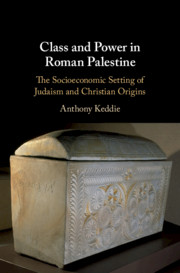
- Cited by 4
-
Cited byCrossref Citations
This Book has been cited by the following publications. This list is generated based on data provided by Crossref.
2020. Books Received. Church History, Vol. 89, Issue. 1, p. 242.
2020. BOOKS RECEIVED 2019–20. New Testament Studies, Vol. 66, Issue. 4, p. 630.
2020. Books Received. Harvard Theological Review, Vol. 113, Issue. 1, p. 146.
GIRARDIN, Michaël 2023. Oppression, exploitation, persécution ? Historiographie de la fiscalité en Judée séleucide et romaine. Archimède. Archéologie et histoire ancienne, Vol. 10, Issue. , p. 106.
- Publisher:
- Cambridge University Press
- Online publication date:
- October 2019
- Print publication year:
- 2019
- Online ISBN:
- 9781108656757
- Subjects:
- Ancient History, Classical Studies, Religion, Church History




